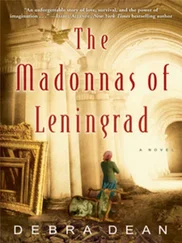Debra Dean - The Mirrored World
Здесь есть возможность читать онлайн «Debra Dean - The Mirrored World» весь текст электронной книги совершенно бесплатно (целиком полную версию без сокращений). В некоторых случаях можно слушать аудио, скачать через торрент в формате fb2 и присутствует краткое содержание. Город: New York, Год выпуска: 2012, ISBN: 2012, Издательство: HarperCollins, Жанр: Историческая проза, на английском языке. Описание произведения, (предисловие) а так же отзывы посетителей доступны на портале библиотеки ЛибКат.
- Название:The Mirrored World
- Автор:
- Издательство:HarperCollins
- Жанр:
- Год:2012
- Город:New York
- ISBN:978-0-06-221855-1
- Рейтинг книги:5 / 5. Голосов: 1
-
Избранное:Добавить в избранное
- Отзывы:
-
Ваша оценка:
The Mirrored World: краткое содержание, описание и аннотация
Предлагаем к чтению аннотацию, описание, краткое содержание или предисловие (зависит от того, что написал сам автор книги «The Mirrored World»). Если вы не нашли необходимую информацию о книге — напишите в комментариях, мы постараемся отыскать её.
returns with a breathtaking novel of love, madness, and devotion set against the extravagant royal court of eighteenth-century St. Petersburg.
Born to a Russian family of lower nobility, Xenia, an eccentric dreamer who cares little for social conventions, falls in love with Andrei, a charismatic soldier and singer in the Empress's Imperial choir. Though husband and wife adore each other, their happiness is overshadowed by the absurd demands of life at the royal court and by Xenia's growing obsession with having a child—a desperate need that is at last fulfilled with the birth of her daughter. But then a tragic vision comes true, and a shattered Xenia descends into grief, undergoing a profound transformation that alters the course of her life. Turning away from family and friends, she begins giving all her money and possessions to the poor. Then, one day, she mysteriously vanishes.
Years later, dressed in the tatters of her husband's military uniform and answering only to his name, Xenia is discovered tending the paupers of St. Petersburg's slums. Revered as a soothsayer and a blessed healer to the downtrodden, she is feared by the royal court and its new Empress, Catherine, who perceives her deeds as a rebuke to their lavish excesses. In this evocative and elegantly written tale, Dean reimagines the intriguing life of Xenia of St. Petersburg, a patron saint of her city and one of Russia's most mysterious and beloved holy figures. This is an exploration of the blessings of loyal friendship, the limits of reason, and the true costs of loving deeply. Review
“In her excellent second novel, THE MIRRORED WORLD, Debra Dean has composed a resonant and compelling tale…. Dean’s writing is superb; she uses imagery natural to the story and an earlier time.”
Seattle Times
“For those familiar with the story of St. Xenia, this is a gratifying take on a compelling woman. For others, Dean’s vivid prose and deft pacing make for a quick and entertaining read.”
Publishers Weekly
“Love affairs, rivalries, intrigues, prophecy, cross-dressing, madness, sorrow, poverty—THE MIRRORED WORLD is a litany of both the homely and the miraculous. Intimate and richly appointed, Debra Dean’s Imperial St. Petersburg is as sumptuous and enchanted as the Winter Palace.”
Stewart O’Nan, bestselling author of
“THE MIRRORED WORLD explores the mysteries of love and grief and devotion. Against a vivid backdrop of eighteenth century St. Petersburg and Catherine the Great’s royal court, the woman who would become St. Xenia is brought fully to life. Is there a more imaginative, elegant storyteller than Debra Dean?”
Ann Hood, bestselling author of
“With evocative, rich prose and deep emotional resonance, Debra Dean delivers a compelling and captivating story that touches the soul. Truly a wonderful read.”
Garth Stein, bestselling author of
“Transporting readers to St. Petersburg during the reign of Catherine the Great, Dean brilliantly reconstructs and reimagines the life of St. Xenia, one of Russia’s most revered and mysterious holy figures, in a richly told and thought-provoking work of historical fiction.”
Bookreporter.com “Dean’s novel grows more profound and affecting with every page.”
Booklist
“In Debra Dean’s skilled hands, history comes alive…. Though the world she creates is harsh and cold at times, it is the warmth at its center— the power of love — that stays with you in the end.”
Miami Herald












